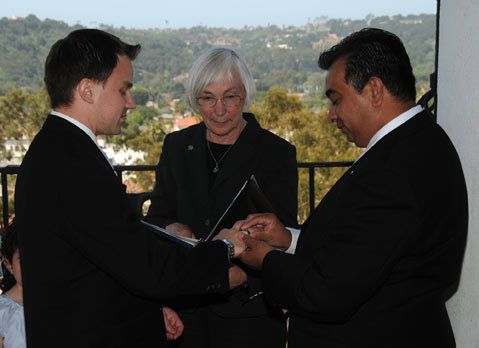Let the Weddings Begin
Supremes Strike Down Bans on Same-Sex Marriage

Supporters of marriage equality wasted little time celebrating the twin Supreme Court decisions striking down a California ballot measure, Prop 8, and a federal law, the Defense of Marriage Act, that denied marriage rights to same-sex couples. “Today is a good day for California and for the nation,” declared Congressmember Lois Capps. “We have much to celebrate.” Capps termed the court rulings “an enormous victory for loving, married couples and their families,” and their right to be treated equally under the law.
Lauren Gunther of the Santa Barbara Equality Project added, “After five years of hard work, we have something to celebrate. But we also have much work to do.” Gunther expressed satisfaction that California will soon become the 13th state to allow same-sex marriage now that the Supreme Court rejected Prop 8. “But there are still a lot of states out there that don’t,” she said.
The high court ruled broadly in striking down the federal Defense of Marriage Act, arguing it intruded upon the exclusive rights of states to define what constitutes a legitimate marriage. It ruled more narrowly, however, in striking down California’s Prop 8, holding that backers of the gay marriage ban — passed in 2008 by a narrow majority — lacked the legal standing to take their case to the Supreme Court in the first place. They did so only after California Governor Jerry Brown and Attorney General Kamala Harris — who argued Prop 8 violated same-sex couples’ constitutional right to equal protection — refused to defend the ballot initiative after it had been struck down by a lower court judge. “There are no appeals left,” said Gunther. “It’s over.”
It remains uncertain as to when same-sex couples will be able to get married in California, but Capps urged Brown “to act swiftly to have the state begin issuing marriage licenses as soon as it can.” Santa Barbara Mayor Helene Schneider — who has campaigned actively on behalf of marriage equality since 2000 when California voters passed Prop 22, the first ballot initiative to ban same-sex marriages in the state — stated, “Dorothy can now see over the rainbow.” Schneider had dressed up as Dorothy from the Wizard of Oz during this year’s Summer Solstice festivities, and had lip-synced “Somewhere over the Rainbow” — the unofficial national anthem for gay and lesbian rights — up State Street with Judy Garland’s rendition playing over loud speakers.
The Santa Barbara Equality Project branch of the Pacific Pride Foundation will host a celebration of the rulings tonight at 6 p.m. at the Santa Barbara County Courthouse.



